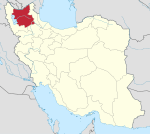Marand
| Marand مرند | |
|---|---|
| city | |
 Marand | |
| Coordinates: 38°25′58″N 45°46′30″E / 38.43278°N 45.77500°ECoordinates: 38°25′58″N 45°46′30″E / 38.43278°N 45.77500°E | |
| Country |
|
| Province | East Azerbaijan |
| County | Marand |
| Bakhsh | Central |
| Government | |
| • Mayor | Kaveh |
| • Parliament | Hassannejad |
| Population (2012[1]) | |
| • Total | 148,875 & 239,209 |
| City & County | |
| Time zone | IRST (UTC+3:30) |
| • Summer (DST) | IRDT (UTC+4:30) |
Marand (Azerbaijani: Mərənd; Persian: مرند; also Romanized as Morand)[2] is a city in and the capital of Marand County, East Azerbaijan Province, Iran. At the 2012 census, its population was 148,875, in 43,167 families.
Marand is among major cities in the province. It is located in the north-west of capital of the province Tabriz. Sheikh Usman Marandi was one of the most famous inhabitants of Marand. Marand had various names in history, such as Maryana and Mandagarana.
History
The history of the town goes back to the pre-Islamic era.[3] Between 815 till 850, Marand was primarily controlled by Mohammad ibn Ba'ith who was Iranicized to a considerable extent.[3] The elders of Maragha who quoted his Persian poetry also praised his bravery and his literatry ability.[3] He was Iranicized to considerable extent and the statement of Tabari on him is evidence of the existence of the cultivation of poetry in Persian in northwest Persia at the beginning of the 9th century.[3]
In the news
During February 2010, it was reported that an attack was carried out in the city of Marand, against a truck which was carrying tear gas and other substances for the use of the Iranian Revolutionary Guards.[4] The Iran Liberation Front claimed responsibility for the attack through a video posted on YouTube.[5]
Famous natives
For a complete list see: Category:People from Marand
- Muhammad ibn al-Ba'ith (8th and 9th centuries) - Arab governor of Marand
- Ganjali Sabahi (1909-1990) - Writer
- Aboutaleb Talebi (born 1945) - wrestler
- Musa Kalantari (1949-1981) - politician
- Jalil Farjad (born 1951) - Theatre and film actor
- Gholamreza Shafeei (born 1951) - politician
- Isa Kalantari (born 1952) - politician
- Mohammad-Taghi Pourmohammadi (born 1956) - cleric
- Shirin Bina (born 1964) - Theatre and film actor
- Meysam Naghizadeh (born 1986) - football player
- Mohsen Delir (born 1988) - football player
See also
References
- ↑ Population according to statistical center of Iran in Persian
- ↑ Marand can be found at GEOnet Names Server, at this link, by opening the Advanced Search box, entering "-3074041" in the "Unique Feature Id" form, and clicking on "Search Database".
- 1 2 3 4 Minorsky, “Marand” in Encyclopaedia of Islam. P. Bearman , Th. Bianquis, C.E. Bosworth, E. van Donzel and W.P. Heinrichs (eds.). Vol. 6, (1991): p. 504 "According to one of al-Tabari's authorities (iii, 1388), the shaykhs of Maragha who praised the bravery and literary ability (adab) of Ibn Bai'th also quoted his Persian verses (bi'l-fdrisiyya). This important passage, already quoted by Barthold, BSOS, ii (1923), 836–8, is evidence of the existence of the cultivation of poetry in Persian in north-western Persia at the beginning of the 9th century. Ibn Bai’th must have been Iranicised to a considerable extent, and, as has been mentioned, he relied for support on the non-Arab elements in his Rustakhs (‘Uludj Rasatikhi’)”
- ↑ La misteriosa Azadeh contro i Pasdaran «Ho attaccato un camion di lacrimogeni» – Corriere della Sera. Corriere.it (11 February 2010). Retrieved on 2013-05-18.
- ↑ jabhe.azadi.wmv. YouTube (2010-02-06). Retrieved on 2013-05-18.
| ||||||||||||||||||||||||||||||||||||||||||||||||||||||||||||
